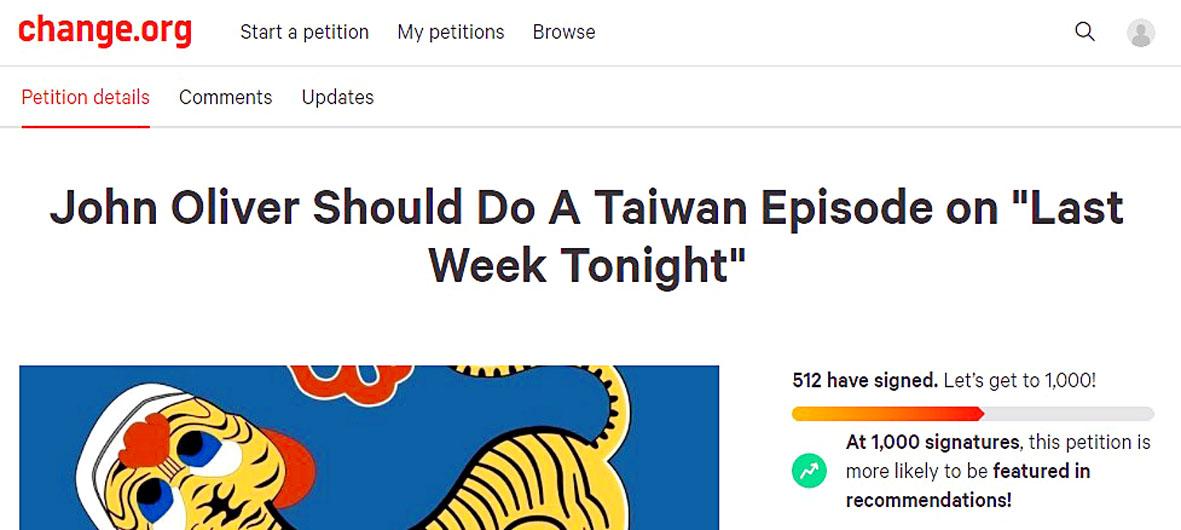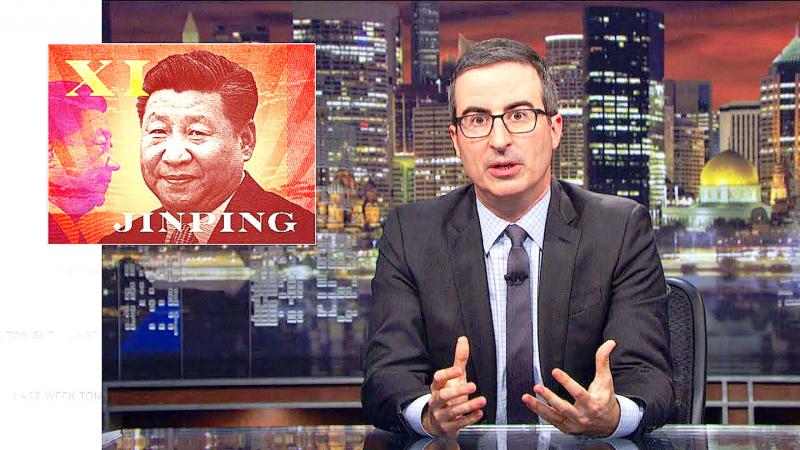British-American John Oliver roasted Chinese leader Xi Jinping (習近平) in 2018 and slammed China’s treatment of Uighurs in Xinjiang last year. Now some want him to do a segment on Taiwan.
More than 500 people have signed a petition launched last week asking Oliver to discuss Taiwan’s complex political situation and its international significance on his HBO show Last Week Tonight.
Jenna Cody, an American teacher-trainer and prolific blogger who has lived in Taiwan for 15 years, says she created the petition during a night of insomnia. Cody’s blog is quick to dispel one-sided or misinformed Western reports of the country, but she says the issue remains widely misunderstood.

Screen grab: Han Cheung, Taipei Times
“For a lot of us who write about Taiwan, I feel that our audience is just people who care about Taiwan,” Cody says. “It doesn’t feel like we’re getting any sort of general viewership. Taiwan makes it into the mainstream media, but it’s always through the China lens.”
Along with items such as unlimited term limits and detained activists, Oliver panned Chinese media censorship during his segment on Xi (where he also joked about comparisons with Winnie the Pooh). As expected, China reacted by blocking HBO and erasing Oliver from microblogging Web site Sina Weibo.
“Of all the late night comedy news shows, I feel that [Oliver] is probably the best person to take this on,” Cody says. “He’s willing to criticize China … a lot of those news guys don’t do that. He also tends to do in-depth things and I think Taiwan really needs an in-depth look. So I was up late and I thought, ‘Why don’t I pull a stunt and see if I can get something to happen?’”

Photo: screen grab from HBO’s Last week Tonight With John Oliver
Oliver typically spends 20 to 30 minutes doing a deep dive on a single topic in a sharply critical yet informative and humorous manner.
“He’s able to break down very serious issues in a way that keeps people’s attention,” Cody says. “His brand of humor can take something that people don’t think about or find boring … and make them realize that it is in fact very important.”
There are many angles to approach the Taiwan issue from, but Cody says that from her experience, foreign understanding of Taiwan is still low, and a general overview is needed.
“My grandma once asked me why I live here since it’s not a democracy,” she says. “So just letting people know that Taiwan is in fact independent and doesn’t want to be part of China is enough. A lot of people think because Taiwan calls itself the ROC [Republic of China], they assume Taiwanese think they are Chinese. It’s a lot of work on my part to quash that every time it comes up.”
Cody says that when she criticizes China in Taiwan, it’s usually apparent that she’s talking about the Chinese Communist Party. But in the US, people seem to project negative commentary onto the entire country, which has fueled anti-Asian sentiment across the nation.
Oliver has spoken out about racism in the past. In March, he railed against former US president Donald Trump and other politicians for calling COVID-19 the “China virus,” stating that doing so has led to an increase in violence against people of Asian descent. And two weeks ago he did a 27-minute, detailed segment on Asian Americans to contextualize their layered history and the model minority myth in light of current events.
“Looking at what he’s done recently, I think he would be able to handle the issue sensitively as well as correctly,” Cody says.
Cody adds that instead of just complaining about the vaccine situation, foreigners in Taiwan can help the situation by doing more outreach to people back home
“While not perfect, this is a country worth knowing about and fighting for,” she says. “You can do PR stunts, you can write your opinions, or just talk to your friends.”

Taiwan has next to no political engagement in Myanmar, either with the ruling military junta nor the dozens of armed groups who’ve in the last five years taken over around two-thirds of the nation’s territory in a sprawling, patchwork civil war. But early last month, the leader of one relatively minor Burmese revolutionary faction, General Nerdah Bomya, who is also an alleged war criminal, made a low key visit to Taipei, where he met with a member of President William Lai’s (賴清德) staff, a retired Taiwanese military official and several academics. “I feel like Taiwan is a good example of

March 2 to March 8 Gunfire rang out along the shore of the frontline island of Lieyu (烈嶼) on a foggy afternoon on March 7, 1987. By the time it was over, about 20 unarmed Vietnamese refugees — men, women, elderly and children — were dead. They were hastily buried, followed by decades of silence. Months later, opposition politicians and journalists tried to uncover what had happened, but conflicting accounts only deepened the confusion. One version suggested that government troops had mistakenly killed their own operatives attempting to return home from Vietnam. The military maintained that the

Before the last section of the round-the-island railway was electrified, one old blue train still chugged back and forth between Pingtung County’s Fangliao (枋寮) and Taitung (台東) stations once a day. It was so slow, was so hot (it had no air conditioning) and covered such a short distance, that the low fare still failed to attract many riders. This relic of the past was finally retired when the South Link Line was fully electrified on Dec. 23, 2020. A wave of nostalgia surrounded the termination of the Ordinary Train service, as these train carriages had been in use for decades

Lori Sepich smoked for years and sometimes skipped taking her blood pressure medicine. But she never thought she’d have a heart attack. The possibility “just wasn’t registering with me,” said the 64-year-old from Memphis, Tennessee, who suffered two of them 13 years apart. She’s far from alone. More than 60 million women in the US live with cardiovascular disease, which includes heart disease as well as stroke, heart failure and atrial fibrillation. And despite the myth that heart attacks mostly strike men, women are vulnerable too. Overall in the US, 1 in 5 women dies of cardiovascular disease each year, 37,000 of them